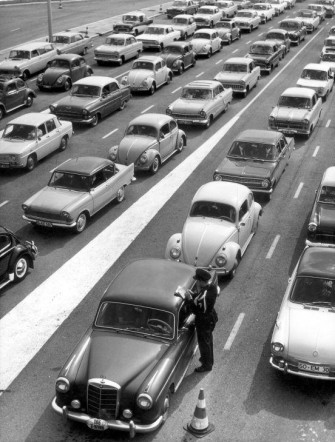
The darker side of traffic jams: Congestion costs billions to world economy
 Traffic Jam in Holland, 1964As roads worldwide continue to be clogged with cars, it's time to ask ourselves how much does a traffic jam really cost? A recent study from the Texan Transport Institute pinned the US figure at 101 Billion dollars annually. ECF Policy Officer Ceri Woolgrove investigates the darker side of traffic jams.
Traffic Jam in Holland, 1964As roads worldwide continue to be clogged with cars, it's time to ask ourselves how much does a traffic jam really cost? A recent study from the Texan Transport Institute pinned the US figure at 101 Billion dollars annually. ECF Policy Officer Ceri Woolgrove investigates the darker side of traffic jams.
We often hear how cars pump a lot of money into the economy providing a country with a source of employment and national industry. But the flipside of the coin is that car clogged streets hurt the public and private purse.
A recent study from the Texas Transport Institute has made headlines in the US and beyond by quantifying these costs. It produced some remarkable numbers:
- Using standard measures, waste associated with traffic congestion summed to $101 billion of delay and fuel cost
- The cost to the average commuter was $713 in 2010 compared to an inflation-adjusted $301 in 1982
- Sixty million Americans suffered more than 30 hours of delay in 2010
- 1.9 billion gallons of fuel were wasted because of traffic congestion
- Traffic congestion caused aggregate delays of 4.8 billion hours.
These figures perhaps aren’t anything new for the European Cyclists’ Federation. Europe too has its fair share of traffic woes which have proven to be equally costly. Transport 2012.org puts a 200 billion Euro price tag on congestion in Europe (approximately 2% of GDP). Central America also has its traffic woes. Let's not forget other countries. On the weekend, Panama found that the price of congestion for business and the community was somewhere between $500 million-$2 billion annually. According to the Asian Development Bank, road congestion costs economies 2%–5% of gross domestic product every year due to lost time and higher transport costs
It’s a pity the Texan report mentioned little about the bicycle. A study showed that "…reducing the number of cars by 10% during peak hour will increase average car speed by approximately 10kph, which will reduce travel times by about 25%". With 6 bicycles fitting into the space of an average car it is not only the health and environmental benefits of the bicycle that are important bikes can also dramatically improve the flow of traffic, which gives a major boost to the economy.
Even in countries which suffer from poor planning and urban sprawl, the rise of multi-modal Homo Sapiens will help ease the pain of congestion. Bike sharing offers a great way to get around for 'the last mile', albeit between transport nodes, or from the public transport to the final destination. Indeed, intermodality is likely to become increasingly important issue and will be the theme of the upcoming International Transport Forum in Leipzig, 2012.
This report makes one thing clear: Policies that favour individual motorized transports are becoming too expensive to maintain, especially in times of austerity.
The report from the Texas Transport Institute can be found here

About the Author
Ceri Woolsgrove is the ECF Policy Officer for Road Safety & Technical Issues. He is from the UK and has worked extensively in London, Brighton, Liverpool (UK), Hang Zhou (China) and now in Brussels. His previous employment was for an organisation representing the transport industry in Brussels. Ceri has a Master’s degree in Globalization and International Policy Analysis from the University of Bath, and Social and Political Thought from the University of Sussex
Contact the author
Recent news!
Upcoming events
Contact Us
Avenue des Arts, 7-8
Postal address: Rue de la Charité, 22
1210 Brussels, Belgium









